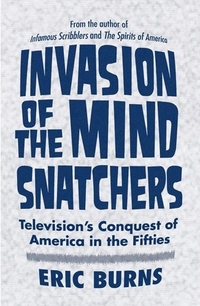

Purchase
Invasion Of The Mind Snatchers
Eric Burns
Television's Conquest of America in the Fifties
Temple University Press
June 2010
On Sale: May 28, 2010
353 pages
ISBN: 1439902887
EAN: 9781439902882
Hardcover
Add to Wish List
Non-Fiction
When the first television was demonstrated in 1927, a
headline in The New York Times read, “Like a Photo
Come to Life.” It was a momentous occasion. But the power of
television wasn’t fully harnessed until the 1950s, when the
medium was, as Eric Burns says, “At its most preoccupying,
its most life-altering.” And Burns, a former NBC News
correspondent who is an Emmy-winner for his broadcast
writing, knows about the impact of television. Invasion of the Mind Snatchers chronicles the
influence of television that was watched daily by the baby
boomer generation. As kids became spellbound by Howdy
Doody and The Ed Sullivan Show, Burns reveals,
they often acted out their favorite programs. Likewise, they
purchased the merchandise being promoted by performers, and
became fascinated by the personalities they saw on screen,
often emulating their behavior. It was the first generation
raised by TV and Burns looks at both the promise of
broadcasting as espoused by the inventors, and how that
promise was both redefined and lost by the corporations who
helped to spread the technology. Yet Burns also contextualizes the social, cultural, and
political events that helped shape the Fifties—from Sputnik
and the Rosenberg trial to Senator Joseph McCarthy’s Red
Scare. In doing so, he charts the effect of television
on politics, religion, race, and sex, and how the medium
provided a persuasive message to the young, impressionable
viewers.
Comments
No comments posted.
Registered users may leave comments.
Log in or register now!
| 


 © 2003-2024 off-the-edge.net
all rights reserved Privacy Policy
© 2003-2024 off-the-edge.net
all rights reserved Privacy Policy